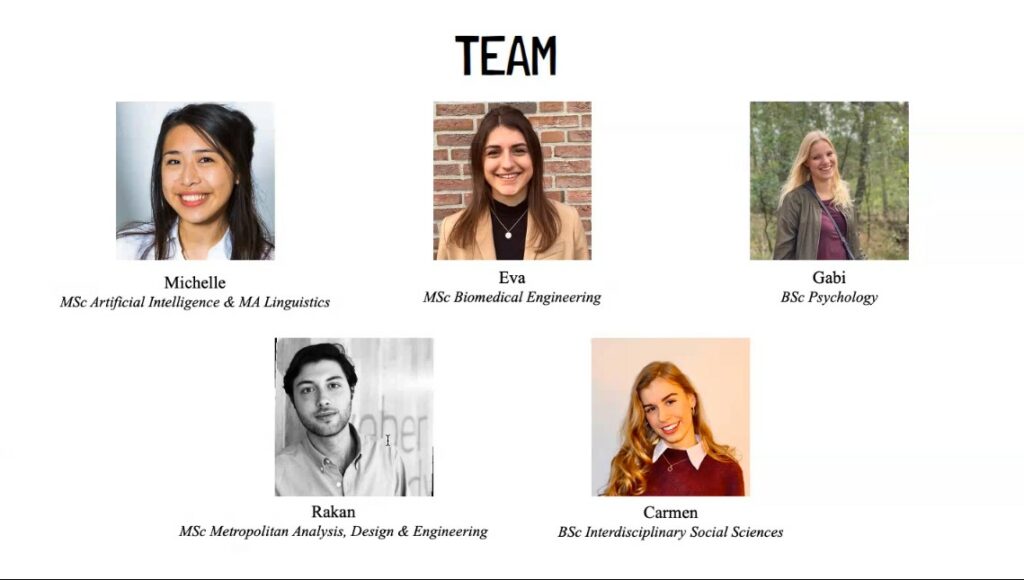49 students from TU/e, WUR, UU and UMC Utrecht worked together on the Covid Challenge for eight weeks. The City of Utrecht gave the students the assignment to come up with innovative, non-repressive measures to limit the impact of Covid-19 in residents’ daily lives. Last Thursday, the students presented their ideas to a jury in the final event of the challenge.
Missing social interaction, poor air quality indoors, and the ‘blah’ feeling you develop during a lockdown: these are just a few of the problems that the students’ teams aimed to tackle. On Thursday morning, seven teams of students presented their ideas to a jury composed of policy consultants from the cities of Utrecht and Wageningen and researchers from the institutions. The winning idea was an easily implemented solution with an outsize effect: the campaign ‘Open een raam, zo gedaan!’ (Just open a window!). The team that proposed the idea was made up of students Eva van den Hurk (TU/e, MSc Biomedical Engineering), Rakan Dajani (WUR, MSc Metropolitan Analysis, Design & Engineering), Gabi Arkensteijn (UU, BSc Psychology), Michelle Chan (UU, MSc Artificial Intelligence & MA Linguistics) and Carmen Vaessens (UU, BSc Interdisciplinary Social Sciences)
Just open a window!
The coronavirus spreads up to 20 times faster inside a poorly ventilated space than it does outdoors. According to the WHO, the RIVM and the municipal health service, the problem can easily be solved by opening a window for 15 minutes a few times per day. Carmen: “The problem with that is: not enough people are aware of this simple solution. So our campaign focuses on raising awareness among residents in order to fight the spread of the virus.”
Municipality as client
The City of Utrecht can look back on a unique process. Sabina Super, municipal health expert in Utrecht: “What goes for the students, goes for us, professionals as well. Working together, outside your own field of expertise is a win-win situation: you learn from each other, learn to understand each other, opening doors to collaboration in the city and in the region. So our challenge is still there. Moreover we would love to help the students actually implement their ideas, if that’s what they want to do.” Rakan: “I thought it was great to work for a client: the municipality had a problem, and they could actually use our help.” Gabi: “In ‘normal’ courses, you write essays or articles and that’s pretty much where it ends. Here, you know why your work is important. And that’s really inspiring.” Dimitra Mousa, Covid Challenge project leader: “The city didn’t only consider the solutions that the students suggested, but especially the students’ learning process. That mindset at the Municipality made the partnership run smoothly and pleasant for everyone.”
Different perspectives
In this challenge, students from the four institutions came together to combine their various academic disciplines. Eva: “It quickly became clear that the problem went so far beyond the images you’ve seen of hospitals and sick people. Social, economic, geographical and historical aspects also play an important role. I’m a student at TU/e. To me, it’s new and fascinating to learn more about the non-technical perspectives.” Project leader Dimitra Mousa emphasised that the project team also learned from the different perspectives among the universities.
Focus on the student
The alliance places a high priority on challenge-based learning. The students are presented with a broadly formulated challenge, have access to a variety of experts, and can then choose which of the facilities they would like to utilise. Dimitra: “As a lecturer, you don’t have complete control over the direction the students choose. They can come to you for advice, but in the end they’re in charge.” Carmen: “It’s a different type of education. You have the responsibility to design your own learning process. You get some guidance, of course, but you don’t have the sense that the lecturer is doing it all for you.” Rakan: “The more effort you put into it, the more you get out of it!”
